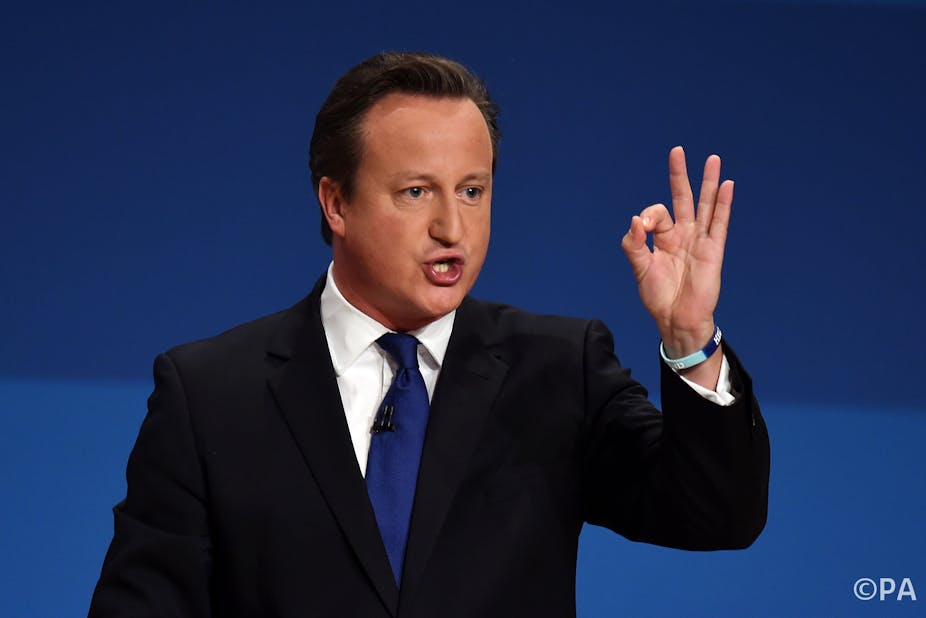Now the Conservative Party’s 2014 conference is over, the rhetorical battle lines between David Cameron and Ed Miliband have been drawn more clearly than ever – and the prime minister’s turn in Birmingham showed he is the savvier performer by far.
Of course, he had a rather easier task on his hands. There’s a hoary old truism in British politics that party leaders’ conference speeches don’t really matter all that much – or at least, that they tend to matter much more to those gunning for the job of prime minister than to the incumbents they are attempting to displace.
Alastair Campbell understood this; as his diaries of the Blair years show, the docu-drama days of panic and angst in opposition had wound down to calm (or calm-ish) reflections by the 2000 conference, when “the speech had caused less angst than in previous years, but seemed to work pretty well”. This despite the stench of a major fuel crisis, which provided the Conservatives’ only gasp of polling success throughout Blair’s time as leader.
But while the incumbency advantage may have made things easier for Cameron, he also showed a determination to turn the speech to his best advantage, not just cruise through – and at the same time, finally fully shed some of his more grating rhetorical habits.
While electoral predicaments, circumstances and contingencies dictate any party’s room for manoeuvre, politicians can always try to dispel trouble if they have the nerve to tackle it head-on. This Cameron did on various points – and particularly with his announcement of an increased tax-free personal allowance. When a party is freed from the corrosive introspection of opposition, moves like this suddenly become a lot easier.
Walking the walk
Clearly, Cameron is able to work the prime ministerial aura to his advantage; all the opinion polls on leadership make that obvious. He is surely as conscious of the importance of presentation as any PM that preceded him into Downing Street; the trend towards noteless, podium-free speeches is one he started as a leadership candidate at the party’s 2005 conference, even if he has now quietly abandoned it.
Equally, in the 2010 general election debates, he was the most reliant on the worn-out campaign cliché of the vacuous personal anecdote. He provided endless variations on the theme, with his stories of people such as a “40-year-old black man” who had served in the navy for 30 years.
Based on his performance this year, he appears to have abandoned such devices. Perhaps he’s aware that they’re principally a crutch for the desperate and damned. Miliband, by contrast, was falling over himself to provide anecdotal evidence of his yearning to reach “beyond the Westminster bubble”, with an endless list of “friends” – worst of all, the much-vaunted Gareth from Hampstead Heath.
But this wasn’t just a style choice: in economic and social terms, Cameron’s Conservatives are fighting to emphasise the macro over the micro, the mechanical over the material – to shore up people’s confidence in their stewardship of the system and take the focus off the flat-lining misery of many Britons’ everyday lives.
It would therefore make no sense for Cameron to wax sentimental about the experiences of those who find themselves at the sharp end of the government’s austerity policies.
Hitting home
Instead, a drop of emotional authenticity was in order. And that was most clear in Cameron’s emotional riff on the NHS and his announcement that its budget would be ring-fenced. It made perfect sense to draw upon his personal experiences to emphasise policy, beyond all else to neuter an attack Labour had ready and primed – an area where the opposition has a particular polling advantage.
Indeed, the near-consensus in reactions to the speech was that the NHS passage was particularly powerful, both as realpolitik and as a way of demonstrating some personality and political conviction – another major weak spot for someone who reportedly once said he wanted to be prime minister “because I’d be quite good at it”.
The despondent Miliband camp may try and take comfort from the fact that ultimately, come May 2015, the sharp contrast between the two leaders’ speeches won’t figure in the campaign. But as a display of the vast perception gaps between the two men, Cameron’s performance will surely have Labour deeply worried about the campaign ahead.

